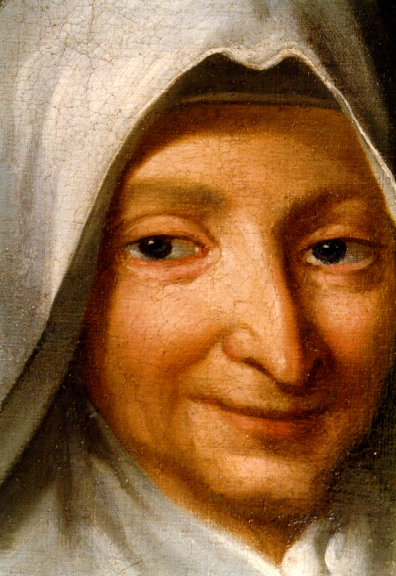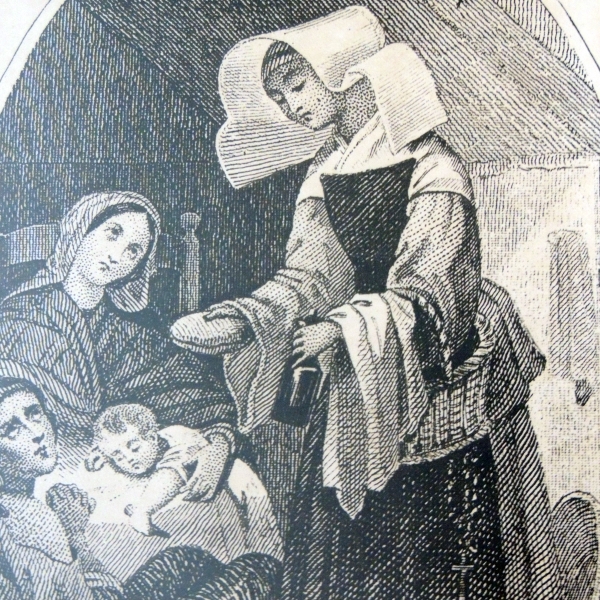Our Foundress
 Marie Poussepin
Marie Poussepin
Marie Poussepin, born in Dourdan (France), was baptized on October 14, 1653 in the church of St. Pierre by the parish priest Etienne Legou. She belonged to a family of artisans, dedicated to the work of making hand knitted silk stockings: they were well-off, thriving economically. She lived in a Christian home committed to religious and civic society: her father Claude collaborated with parish activities; her mother Julienne Fourrier was treasurer of the confraternity of Charity dedicated to the care of to the sick poor.
Marie attended the only school in the town, managed by a group of pious lay people. She was a smart and well-gifted student, pious and open to others. From an early age, she accompanied her mother on visits to the sick and her heart was full of tenderness and compassion for their misfortune. Later she wrote, "Everything must aim to the care of the sick and the weak, it is Jesus Christ who is served in the person."
She was attentive to the children who were helping in her family workshop. When she became an educator, her main concern will be to “bring the knowledge and love of Jesus Christ” to others and to form the students of the little school in the values of the Gospel. Her method of teaching was realistic and concrete.
The death of her mother occurred very early, leaving her with all the responsibility of the home and the education and care of her younger brother Claude of just 10 years old. This was then followed by her father’s critical financial problems, his breakdown, illness and death.
That which distinguished her from the women of her time of the seventeenth century in which there were spiritual opportunities and charitable foundations abound, is her perception of the new needs and her audacity to respond to the problems of her time. Her sense of justice and gratuity, prudence in all her actions, innovative and creative, yet always centered on God as an entrepreneur in Dourdan and as Foundress in Sainville.
Thus, after the death of her father, in 1683, with dramatic setbacks generated by emerging industrialization, she becomes a model as an innovator of manufacturing techniques. Abandoning her traditional craftwork, she introduces weaving looms for making stockings, forsaking silk she adapted to the wool industry, which is more profitable. She welcomed apprentices from modest environments, between 15 to 18 years of age and exempted them from the payment of a fee which they ordinarily should pay. She provided for them of a real social training and promotion. She collaborated in the economic and social development of the family and the city of Dourdan. At the same time, she cultivated an intense spiritual life supported by charitable activities and the spirituality of the Third Order of St. Dominic.
Nevertheless, the Lord calls her to a greater vocation and to a unique service. In 1696, after having heard about the ignorance and misery in Sainville, 17 kilometres from Dourdan, she decided to leave everything to commit herself totally "to the service of charity”, “usefulness in the parish”. How? By forming “a community of Third Order of St. Dominic, to instruct the children and to serve the sick poor of the country side.”
A Community of the Third Order of St. Dominic, to instruct the children and serve the sick poor
For this, Marie leaves Dourdan, her securities, and the fame that surrounds her. She renounces in the spirit of the Gospel all that she possesses, making a donation in an official act on November 13, 1697, to Noëlle Mesnard, a novice from Sainville, first in the long list of the Dominican sisters of Charity. She did it as a Dominican in the presence of Fr. Mespolié o.p who helped her in her spiritual journey and Gabriel Debilly, the parish priest.
That same year, Marie, begins to plant the seeds of her Charism in Janville, followed by 19 communities in six dioceses around Chartres. All were dedicated to the education of the children without possibilities of formation in their rural settings and relief to the sick in their homes and in the hospitals. Her Rule, approved in 1738 by the Bishop of Chartres, calls for a fraternal life in community animated by contemplative and liturgical prayer, the Eucharist, asceticism, study and assiduous work that assures the means for daily life and gratuitous service in the schools.
After 90 years of life totally committed to others, marked by suffering and renunciation, according to her own words, she said that her community was solely “the work of Providence.” Marie Poussepin will enjoy eternal rest in the Lord on January 24, 1744.
One of her many trials was that of having to renounce the Dominican identity for her community; this idea was not acceptable in her time. Both the Bishop of Chartres and the Master of the Order could not conceive of a Dominican life outside the cloister. In 1897, the Congregation will regain its Dominican identity but it will be aggregated definitely to the Order only in 1959.
Today, the Dominican Sisters of Charity of the Presentation, in fidelity to the Project of their Foundress, work in 36 countries in four continents at the service of the Church. Marie Poussepin traced a path... others, after her, heirs of her spirit and Charism, strive to respond to the calls of their time, to the urgency of evangelization, maintaining the original vision and priority for the poor through a great diversity of presences.
Pope John Paul II beatified Marie Poussepin on November 20, 1994 in Rome, Italy.
Source: cf. The booklet for the liturgical celebration of the Beatification of Marie Poussepin, November 20, 1994


 EN
EN  ES
ES  FR
FR 




